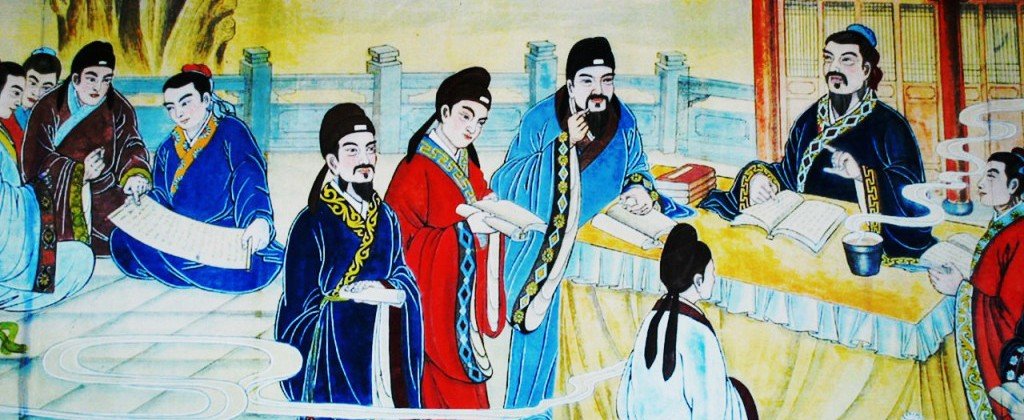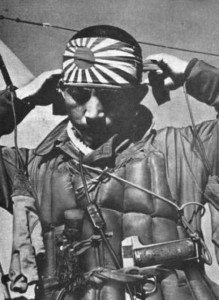Banzai
Banzai
- Banzai (Ban: 10,000; zai or sai: years)
- Ban-Banzai (Ten Times Ten Thousand Years)
- Wan-sui (Chinese characters read as “Banzai” in Japan)
- Mansai (Pronunciation of Banzai)
Banzai! “Hurrah” to the Japanese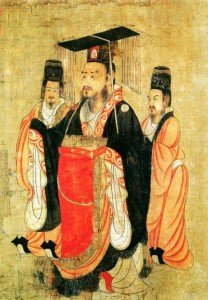
Banzai was first spoken in China. Ho-Shih-Pi was a great desire of King-Emperor Chou of the Chin Dynasty (255-207 B.C.). He lusted after the exorbitantly expensive Jewel. King Hui of the Chou Dynasty owned the Ho Shih Gem. He was threatened with the expansion of the Chin Dynasty.
The worth of the gem was equal to several provinces in the kingdom. In fear of the expansion, King Hui summoned his messenger Lin Hsiang-Ju. He ordered Lin Hsiang-Ju to ride to King-Emperor Chou’s palace and present the Ho-Shih-Pi to him. Entering the great doors to present the gem to Emperor Chou, shouts of “Wan Sui” (Banzai) filled the air from all the courtiers. A great Hurrah!
In ancient China and Japan Wan-sai rang out when great joy was experienced. Mansai was also shouted in joy. There were many joyous occasions for people to express their happiness. Banzai cheers ring out at every festival and when dignitaries pass through great crowds. It has been in use for more than 2,100 years.
 In 788 Kammu Tenno reigned as the 50th Tenno. A drought fell over the land drying all the streams, wells and ponds. For five months no rain came to the land. It became so severe; farmers could no longer irrigate their dying crops. People became desperate and cried out to Kammu.
In 788 Kammu Tenno reigned as the 50th Tenno. A drought fell over the land drying all the streams, wells and ponds. For five months no rain came to the land. It became so severe; farmers could no longer irrigate their dying crops. People became desperate and cried out to Kammu.
He finished his morning duties and walked in the garden. Among the dried trees he stopped and prayed for rain to once again water the earth. The sky darkened with clouds and a heavy rain began to fall. Plants flushed with green and the streams began to flow again. Overwhelmed with joy and gratitude, all his courtiers jumped with joy shouting, “Banzai!” From that time on it had become the shout of joy for all the people of Japan.
Banzai Becomes the Official Cheer of Japan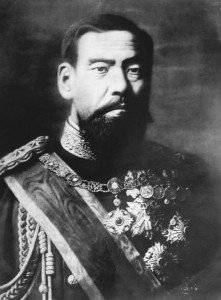
In 1889 Japan made Banzai the national shout. It was official. It now could be called out and cheered throughout the nation. That same year the Constitution of Japan was being promoted by Emperor Meiji. February 11, 1889 is when Emperor Meiji made his stand.
During the promulgation he inspected the troops at the Nijubashi Bridge in the East Gardens of the Imperial Palace. Cheers of Banzai began to fill the air. Students from the Royal High School of Tokyo were shouting, “Banzai!” Not until November 29, 1890 would the constitution be enacted.
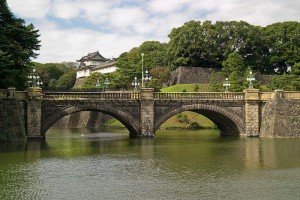 Banzai is believed to bring the Japanese good luck. It is light of heart in the Japanese people and cheered when the people are moved by emotion. Song and cheers arise on the New Year. People in their homes sing and cheer Banzai. It is used to bless the house and frighten demons away.
Banzai is believed to bring the Japanese good luck. It is light of heart in the Japanese people and cheered when the people are moved by emotion. Song and cheers arise on the New Year. People in their homes sing and cheer Banzai. It is used to bless the house and frighten demons away.
World War II
Banzai would take a turn for the worst during World War II. The Japanese warrior’s battle cry, “Temo Heika banzai,” ”Long Live the Emperor!” would strike terror in the enemy. Japanese soldiers would use the banzai charge in a last ditch effort to win a battle.
Many times the banzai charges were acts of suicide against unstoppable opposition. Pacific battles where the charge was employed were terrifying and cost many lives for both the Japanese and those who they were fighting.
Banzai charges proved to be futile atte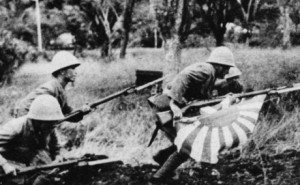 mpts to turn the tide of war. Rather, the charge was an attempt to save the warriors honor. An ancient warrior code Bushido was fulfilled. Death was favored over surrender and possibly becoming a prisoner of war. Ironically “Banzai!” was exclaimed as a victory cheer after winning a battle. The two faces of Banzai were born.
mpts to turn the tide of war. Rather, the charge was an attempt to save the warriors honor. An ancient warrior code Bushido was fulfilled. Death was favored over surrender and possibly becoming a prisoner of war. Ironically “Banzai!” was exclaimed as a victory cheer after winning a battle. The two faces of Banzai were born.
Banzai Today
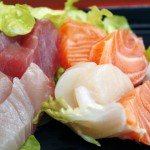 Today Banzai has a duality of meaning; a joyous happy side and a sinister dark side. People use the happy Banzai to imply good things about food, music and just to shout it in pure joy. For example, we have Banzai Sushi and the Banzai Steakhouse.
Today Banzai has a duality of meaning; a joyous happy side and a sinister dark side. People use the happy Banzai to imply good things about food, music and just to shout it in pure joy. For example, we have Banzai Sushi and the Banzai Steakhouse.
Banzai Sushi brings us health and wellbeing through good food. The restaurants are designed to be top notch in service and nutrition. Banzai Steakhouse brings us the best beef can offer, the highest quality beef and service with a smile.
Banzai Skydiving and banzai racing imply a more sinister side. Since WWII Banzai also describes dangerous sports and activities that could end in fatalities. There high risk and perilous.
 This is the mayhem that it has taken on through history. It is a wonderful and beautiful word that describes both order and chaos. Banzai has found its yin and yang. The two forces that are opposite and contrary are actually complementary.
This is the mayhem that it has taken on through history. It is a wonderful and beautiful word that describes both order and chaos. Banzai has found its yin and yang. The two forces that are opposite and contrary are actually complementary.

